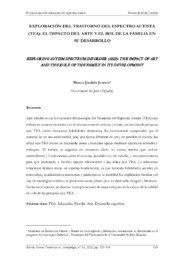Por favor, use este identificador para citar o enlazar este ítem:
https://hdl.handle.net/11000/36597Registro completo de metadatos
| Campo DC | Valor | Lengua/Idioma |
|---|---|---|
| dc.contributor.author | Jándula Justicia, Blanca | - |
| dc.contributor.other | Departamentos de la UMH::Ciencias Sociales y Humanas | es_ES |
| dc.date.accessioned | 2025-05-16T10:23:28Z | - |
| dc.date.available | 2025-05-16T10:23:28Z | - |
| dc.date.created | 2023 | - |
| dc.identifier.citation | Revista Nuevas Tendencias en Antropología, nº14, 2023, pp. 135-154 | es_ES |
| dc.identifier.issn | 2173-0024 | - |
| dc.identifier.uri | https://hdl.handle.net/11000/36597 | - |
| dc.description.abstract | Este estudio revisa la evolución del concepto del Trastorno del Espectro Autista (TEA) con énfasis en avances recientes y en la relación entre el autismo y el arte, un área donde personas con TEA suelen demostrar habilidades destacadas. Es fundamental comprender que el autismo no es una enfermedad, sino una forma diferente de ser y de percibir el mundo; los niños con TEA tienen un desarrollo único y necesitan apoyo mediante ajustes en actitudes y enfoques. El trabajo se organiza en secciones clave: un marco teórico que incluye antecedentes y fundamentos sobre el autismo, los objetivos del estudio, y recomendaciones para que profesores y familias apoyen eficazmente a los niños con TEA. La educación emocional destaca como un aspecto fundamental, ya que fomenta habilidades sociales en estos niños, ayudándoles a interactuar y participar en la sociedad. La implicación familiar y el uso de estrategias artísticas se presentan como pilares para su desarrollo integral y bienestar. En las conclusiones, se abordan las implicaciones de estos enfoques en la mejora de la calidad de vida de las personas con TEA | es_ES |
| dc.description.abstract | This study reviews the evolution of the concept of Autism Spectrum Disorder (ASD) with an emphasis on recent advances and the relationship between autism and art, an area where people with ASD often demonstrate outstanding abilities. It is essential to understand that autism is not a disease, but a different way of being and perceiving the world; children with ASD have a unique development and need support through adjustments in attitudes and approaches. The work is organized into key sections: a theoretical framework that includes background and foundations on autism, the objectives of the study, and recommendations for teachers and families to effectively support children with ASD. Emotional education stands out as a fundamental aspect, since it fosters social skills in these children, helping them to interact and participate in society. Family involvement and the use of artistic strategies are presented as pillars for their comprehensive development and well-being. In the conclusions, the implications of these approaches in improving the quality of life of people with ASD are addressed. | es_ES |
| dc.format | application/pdf | es_ES |
| dc.format.extent | 20 | es_ES |
| dc.language.iso | spa | es_ES |
| dc.publisher | Universidad Miguel Hernández de Elche | es_ES |
| dc.rights | info:eu-repo/semantics/openAccess | es_ES |
| dc.rights.uri | http://creativecommons.org/licenses/by-nc-nd/4.0/ | * |
| dc.subject | TEA | es_ES |
| dc.subject | Educación | es_ES |
| dc.subject | Familia | es_ES |
| dc.subject | Arte | es_ES |
| dc.subject | Desarrollo cognitivo | es_ES |
| dc.subject | ASD | es_ES |
| dc.subject | Education | es_ES |
| dc.subject | Family | es_ES |
| dc.subject | Art | es_ES |
| dc.subject | Cognitive Development | es_ES |
| dc.subject.other | CDU::3 - Ciencias sociales | es_ES |
| dc.title | Exploración del trastorno del espectro autista (tea): el impacto del arte y el rol de la familia en su desarrollo | es_ES |
| dc.title.alternative | Exploring autism spectrum disorder (asd): the impact of art and the role of the family in its development | es_ES |
| dc.type | info:eu-repo/semantics/article | es_ES |

Ver/Abrir:
Exploracion del trastorno del espectro autista.pdf
225,81 kB
Adobe PDF
Compartir:
 La licencia se describe como: Atribución-NonComercial-NoDerivada 4.0 Internacional.
La licencia se describe como: Atribución-NonComercial-NoDerivada 4.0 Internacional.
.png)